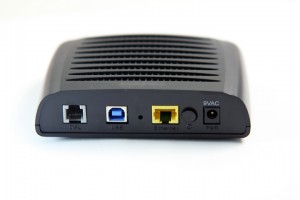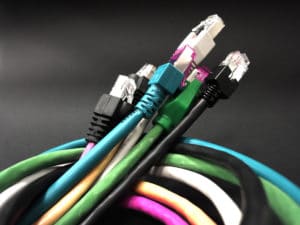Posted by Eric O. Schueler, Senior V.P. of Information Technology
High Speed Internet:
Comparing DSL, Cable, Fiber Optics, Satellite and Wireless
We all want the best, latest and fastest options when it comes to the internet. In this age of instant gratification, we aren’t content staring at an idle page on a computer, phone, tablet or other device while it attempts to locate a page in the billions of bits of content throughout the scope of the internet. Fortunately, because we rely so heavily on the internet, there are several options available to get us that high speed result.
What are your internet options?
Gone are the days of dial up, where a screechy noise pierces your ears as your phone line slowly finds its way to the internet. There are many high speed options to choose from, including DSL, cable, fiber optics, satellite and wireless. Each type of internet will give you different results. They come at different costs and are available in different locations.
DSL
DSL stands for digital subscriber line. If you already have a home or business telephone line, DSL can be a great option for high speed internet. It uses the already available copper wire of your phone line to deliver internet. DSL is reliable and offers consistency; however, it is not as conducive to heavy downloading or file sharing. It is available in more rural areas than cable, and the speeds remain consistent throughout the day because you don’t share your bandwidth with your neighbors. The cost of DSL is normally a bit cheaper than cable and runs from about $35 to $50 a month.
Cable Cable internet uses the cable connected to your TV and a special modem to deliver high speed internet. It is generally one of the fastest options for urban users and is available via your cable provider. It is great for streaming, downloading and file sharing. The only downside to cable is that you share download speeds with your neighbors. This means if all of your neighbors are heavy streamers and downloaders, your speeds can be slower. Your internet can also be slower at certain times of the day when more people are using their devices online.
Cable internet uses the cable connected to your TV and a special modem to deliver high speed internet. It is generally one of the fastest options for urban users and is available via your cable provider. It is great for streaming, downloading and file sharing. The only downside to cable is that you share download speeds with your neighbors. This means if all of your neighbors are heavy streamers and downloaders, your speeds can be slower. Your internet can also be slower at certain times of the day when more people are using their devices online.
Cable internet can range from $25 to $90 a month depending on where you live and the speeds you want to attain. For business, the prices on Cable can be a lot higher. It can cost anywhere from $70 to a few hundred dollars depending on speed and options. Currently Cox Cable ranges all the way up to 100 Mbps (Megabit per second)
Fiber Optics
Fiber optics goes beyond traditional copper lines used for DSL and cable. It uses thin strands of glass (the size of a strand of hair) to send and receive data quickly. The glass conductor in fiber optics prevents interferences that can be problematic in copper lines, so fiber optics is one of the most reliable internet sources. Fiber optics is offered through telecommunication companies such as Verizon and AT&T and generally provides the fastest speeds. It is great for streaming, downloading and file sharing. Fiber optics is offered in limited areas, so it is not yet available for a lot of the population.
Fiber optics can be slightly pricier than DSL and cable and can range from $50 to $90 a month depending on the speed. Often these companies bundle other services with internet to bring costs down. For business, the prices on Fiver Optics can be a lot higher. Like cable, it can cost anywhere from $70 to a few hundred dollars depending on speed and options. Verizon Fios ranges up to 300 Mbps (Megabit per second), but Fios is not available in most areas.
Satellite
Satellite internet works the same way as satellite TV. You have a dish and a modem that send and receive data from a satellite in space via your satellite internet provider. Satellite internet is available for people in even the most rural areas; however, its availability also depends on sight lines. If your home or business is surrounded by trees you won’t be able to use satellite. Also, connections can be lost in heavy storms.
For satellite, we’ve seen the appearance of a slow connection because of the delay in round trip. When you click something it takes a second for the communication to travel to space and back before the download happens. Once you started the download it runs quickly, but if you browsing the internet, it can act very slow because of the latency.
Satellite internet prices range from $50 to $120 depending on the speed, and some satellite companies offer the dish and installation for free with a contract.
Wireless Internet
If you travel a lot or work in the field, you may be a user of 3G or 4G internet. Wireless internet is delivered through cell phone towers, and you are able to receive internet for your computers and tablets the same way you do for your cell phone. Wireless internet is provided by cell phone companies and allows you to have internet access on the go. It delivers high speeds; however, the connection can be low and slow depending how close you are to a cell phone tower. It can also come in and out, repeatedly “kicking” you off the internet. Wireless internet access can be pricey and can depend on the number of devices using the internet. The cellular phone companies have also changed most of their plans, so it is no longer unlimited for the internet. You pay for a certain amount of data you want per month. This can get expensive if you stream a lot of videos on your device, and you’re not using free Wifi. The good news, though, is that many smart phones are now “hot spots” for internet.
Coming next: We explore businesses moving to the cloud, and the importance of a strong, reliable internet connection.
HRCT specializes in business communications, telephone, computers, IT and cabling. This makes them the experts in high speed internet, DSL, Cable, Fiber Optics Satellite and Wireless. They are in the business of keeping your business connected.
Call HRCT today! (757) 399-3350
Posted by Eric O. Schueler, A+, MCP, MCSE, MCTS, CSSA, ACSP – Senior V.P. of Information Technology at HRCT. Eric has been in the business of providing IT and consulting for small and medium business for more than 15 years.
Hampton Roads Communication Technologies (HRCT) provides quality business telecommunications solutions, including computer and IT solutions to companies and organizations throughout the United States, Mid-Atlantic and the Hampton Roads Virginia cities of Portsmouth, Virginia Beach, Norfolk, Chesapeake, Suffolk, Hampton and Newport News and north into Williamsburg and south into the Outer Banks of North Carolina. HRCT keeps your company connected.
Call HRCT today! (757) 399-3350
Sources: netforbeginners.about.com; fiberforall.org/fiber-vs-cable-vs-dsl/





